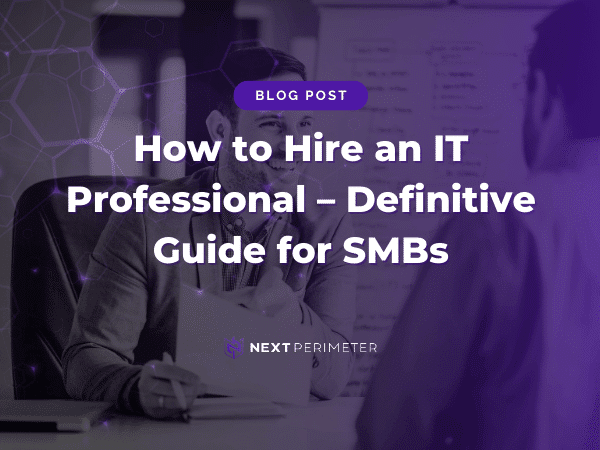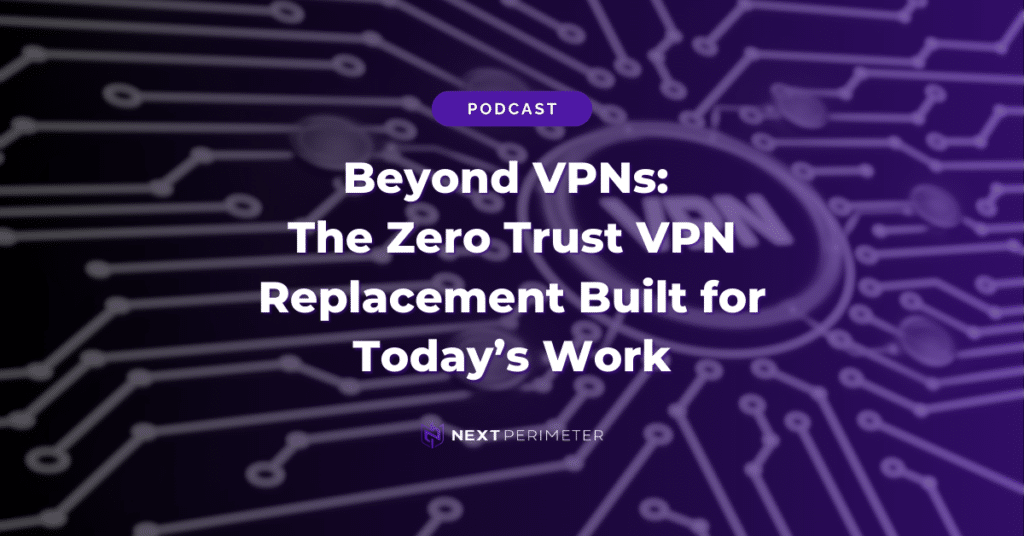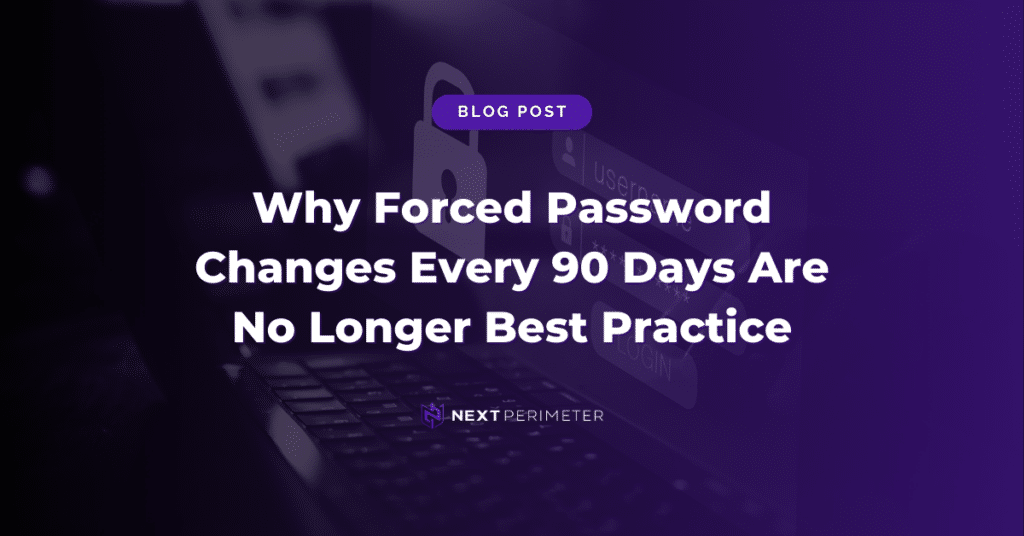Finding ideal employees for your company can be a daunting task but hiring an IT professional can be even more challenging.
By now, you have probably experienced more downtime, unexpected connectivity issues, and your employee performance may be suffering from lackluster or nonexistent IT support. You know it’s time to hire a professional, but where do you even begin?
As companies embrace technology to solve complex problems and gain a competitive advantage, your employees need IT to deliver world-class support at a price point that doesn’t break the bank.
Take it from the IT support experts, we’ll guide you step-by-step through the information technology hiring process so you can hire the ideal IT professional with the resources you have available.
Step 1: Evaluate the Skills Your IT Professional Needs
The first step in finding the ideal IT specialist is recognizing there is no such thing as finding an expert in everything. There are many roles within the IT industry with countless niches and specialties. Analyzing the needs of your business is key to determining the exact IT role you are looking to fill.
Additionally, something very important to note is while the Information technology industry is growing faster than ever before, so is the demand for highly experienced IT staff. According to the annual KPMG CIO survey, over 65% of CIOs are encountering challenges in finding tech talent.
Many companies struggle with their inability to compete with the compensation packages that a startup or venture-backed tech company can offer. Most CIOs are trying to overcome these hurdles by turning to nontraditional and internal training for their IT employees. While there are great IT professionals out there, a meticulous search will be required to find them.
Certifications can demonstrate a baseline level of knowledge, but they are not a replacement for experience. When hiring an IT professional, it’s important to prioritize candidates with the applicable work experience that aligns with the needs of your business.
What we’ve found is that while a Bachelor’s in Computer Science (or relevant field) is a good sign the candidate may have the foundational knowledge to be successful in the IT role, a four-year degree or multiple certifications are not a definitive requirement in today’s market for IT professionals. In fact, over the last 14 years, we’ve found that techs with several certifications underperformed and so now view this as a red flag during the hiring process.
When hiring an IT professional it’s critical to look for experience and technical expertise. While degrees are important, we encourage hiring managers and business owners to not overlook or dismiss potential hires simply because they do not have a formal degree, some of our best tech talent are self-taught rockstars without certifications or a degree.
Hiring an IT professional can be extremely difficult if your company doesn’t have the in-house technical expertise to accurately qualify candidates. Thankfully, there are resources that a business can turn to like eSkill – a service that provides pre-employment testing to help you look past the resume and verify if your IT candidate has the technical skills needed to succeed in their role.
In addition to having the qualifying certifications you also want to consider the soft skills that are necessary for your IT professional to be able to thrive and grow within your company. Let’s look at the most essential soft skills that are needed when hiring an IT pro.
Three Essential IT Skills to Consider When Hiring an IT Professional
To be truly successful in business, IT professionals need both the technical expertise and soft skills. Your future hire needs to be able to effectively collaborate with others, interact with different personalities, navigate corporate politics, and be able to communicate the value of their services or ideas to the rest of the team.
Here are three essential soft skills hiring managers need to watch out for when hiring an IT professional:
- Passion and a Thirst for Knowledge – Passion is what separates the great from the mediocre. An ideal candidate’s passion stems from caring deeply about the impact technology has to move your business forward. As such we have found that the best technicians typically stay up to date on the latest tech trends and frequently tinker with emerging technologies outside the office. An IT professional who is excited about the industry, the job, the work will typically outperform those that view their job as a simple 9-5. As such we always recommend looking for applicants who genuinely like to “tinker”. This passion and thirst for knowledge is especially important when business executives invest in an IT professional who will operate a one-person IT department. IT projects can include a variety of different technologies and skills – none of which will be out of reach for a truly passionate and motivated tech.
- Communication & Collaboration – Technology doesn’t exist in a vacuum. IT professionals need to be able to effectively communicate and work with different audiences within an organization. From resolving every day IT issues directly with your end-users, to presenting complex solutions to c-suite executives- clear and compelling written and verbal communication is key. IT professionals also need to be able to take complex technical topics and communicate them in clear, easy-to-understand terms that non-technical users can understand. An IT professional that only uses industry jargon and “techsplains” will not build the rapport they need to form strong interpersonal relationships at work.
- Empathy and Emotional Intelligence – IT professionals are constantly putting out tech fires and under pressure to work quickly during downtime situations. Often, the employee or customer will be in a state of stress – think back to a time you lost an important file that you spent hours on or a time when your computer failed you with a looming deadline ahead. Were you stressed, anxious, frustrated, or worried? IT professionals need to be able to put themselves in the other person’s shoes, understand and recognize the stress of being unable to work until the repair or fix is in place. The ideal candidate will have a demonstrated history of working well under pressure and acting in a way that builds confidence, calms and reassures their audience.
Step 2: Write a Compelling Job Description
Now let’s move on to the fun stuff, creating the proper job description. To capture the attention of the ideal candidate you want to make sure you tell a story about your company and what their future will look like in their future role.
Considering the high demand for IT professionals in the job market, you want to entice qualified and experienced candidates. Approach writing your job description with the mindset that a qualified, skilled, and experienced IT professional is rare to find. This will help you look at the IT recruitment process with a fresh perspective and draft a job description that focuses on why the IT candidate would be happy to work for your company. Make sure to list the benefits and perks your company is offering.
Helpful Tips to Consider When Drafting an Appealing IT Job Description
- Offer a Competitive Salary. Don’t skimp on your compensation package. Research and identify a competitive salary range for the IT skillset and experience your business needs. We’ve included this information in our job description templates below. In today’s digital-first economy you may be surprised to discover the hidden costs of tech talent turnover which is why it’s key to make competitive offers that help you retain your tech talent. In fact, CIO.com, an industry-leading publication for and by CIOs and business technology executives revealed that more than half of IT professionals are looking for new job opportunities due to under-compensation.
- Assess Your Benefits. Employee benefits and perks play a significant role in retention rates and productivity levels. The cliché “happy employees are productive employees” rings true now more than ever. Many industry-leading businesses are rolling out company-sponsored healthcare, for instance, Next Perimeter offers insurance plans that cover 100% of the monthly cost for medical, dental, and vision for our employees. But benefits go beyond healthcare coverage, paid vacation, and sick leave. More and more candidates are interested in flexible work schedules such as working remote work when needed, and company-sponsored training opportunities. Offering health insurance benefits makes you competitive in the job market while improving employee morale.
- Emphasize Company Culture & Inclusivity. Studies show that at least one-third of job seekers would pass up the perfect job if the corporate culture was a bad fit, and a recent survey found that 72% of workers cited corporate culture as a factor influencing their decision to work at a given company. Therefore, creating a culture that celebrates individual differences that make each of us unique, encourages transparency and collaboration that will ultimately help your business retain your ideal IT candidate.
Step 3: Questions to Ask During an IT Interview
Sifting through resumes to find a perfect fit can be daunting. It is hard to recognize good talent from just reading their resume. When fielding appropriate candidates, you must know which questions to ask. As stated previously, when attempting to find a fit for your company you must find out if they have the technical skills to complete the project, soft skills, and company culture fit.
Asking a diverse set of questions will give you a more well-rounded view of the candidate. While you want to focus on questions that may be more technical, having well-pointed interview questions can tell you if your candidate will be a good fit for your IT needs.
We have put together a list of Interview questions to ask your candidates and make your search easier.
- Start by asking about their Home Network
When an IT professional is truly passionate about their expertise not only are they willing to learn and develop their skills in the workplace, but they also dedicate time to it outside of work. This is why asking about their home network is relevant and can give you greater insight as to how passionate and knowledgeable they really are about their trade. An IT professional that loves technology is usually not satisfied with a typical and ordinary home network. Many IT professionals “homelab” that may include a more robust firewall, a server, switches, NAS backups, and devices that go above what your average consumer would have for their home network. Along with their homelab where they can experiment safely on various technologies, they might also have a home security system that connects to the internet or a fully automated smart home set up. There are countless other features that can improve a home network and so many areas that can be enhanced or modified if you know your way around technology. - How would you explain (a specific technology) in simple terms?Since IT plays a key role in most companies, the ability to communicate technical terms with non-technical people is a must. By asking this question you will be able to assess the candidate’s communication style and skills. You also want to find out whether they can break down complicated terms and processes into simpler terms. Especially if they will be dealing with client-facing issues or simply interacting with non-tech colleagues.
- Is technical knowledge or customer service more important?
A technical specialist should have the right balance between technical and people skills. When they offer a response, you should consider whether the candidate uses logic to answer since it’s an opinion-based question. Moreover, through the response, the candidate should convey their understanding of how both skills play a big role in the job.
By asking these questions during your interview you will be able to understand how qualified the candidate truly is, as well as determining whether they have the collaborative and people skills to succeed within your company.
Step 4: Establish an IT Budget Before Hiring Your First IT Professional
IT budgets require a lot of thought, but the process of drafting, organizing, and presenting your budget doesn’t have to cause you a headache. A well-developed IT budget can provide a focused technology roadmap that elevates your IT operational maturity and overall IT strategy. By making the upfront investment to create a formal budget for your IT department, you’ll avoid making a “wish list” budget that would often support the false view that IT is a cost center rather than a profit center.
When you are creating your IT budget, consider the size of your business and the types of tasks you will be managing on a day to day basis. A well-developed IT budget helps the entire business forecast for short-term and long-term technology needs, as well as, communicates to internal and external stakeholders the initiatives proposed budgetary items will support.
If an IT budget is poorly defined it can create a disconnect between the IT department and other business units leading to failed technology implementations and purchases that don’t align with business objectives. Furthermore, if your IT budget is not well established, you may find yourself spending a considerable amount of money on impulsive IT purchases that could have been consolidated through a budgeting process.
To draft an accurate and cost-effective IT budget we recommend assessing your businesses’ needs. By assessing your IT requirements, you will be able to create a comprehensive analysis of your hardware, licenses, software, and business objectives. Finding a knowledgeable and trusted IT firm can help facilitate the process of creating an unbiased assessment of your technical needs.
Questions to Answer When Creating an IT Budget
- What laptops are we buying employees? Do we have a standardized set of make and models for different roles?
- Marketing and creative teams will usually need more powerful machines for multi-tasking and design tasks, whereas, frontline and general information workers may be fine with more entry-level computers.
- What cloud services do we use? How much do we spend on cloud services?
- What’s the cost per user per month and annum for Office 365 or G Suite?
- When did we purchase our server? When do our warranties expire? If the server is older than five years, you may want to consider purchasing a new one.
- Is there any outdated hardware that needs to be upgraded or refreshed?
- What antivirus or endpoint protection service do we use? How much does it cost per user per month?
- How much does our data backup and disaster recovery solution cost per month?
Exploring Options: Hiring Internal IT or Leverage Managed IT Services
It may seem as if there are many items to review and consider before choosing the ideal IT specialist, however, we often get asked whether it makes sense to hire an IT professional or outsource IT to a managed IT services company. Hiring an in-house IT person comes with plenty of benefits but can be cost-prohibitive for many businesses.
It’s for this reason that small and midsized businesses (SMBs) often approach managed service providers to fulfill their IT support needs.
For business executives, the decision to hire an IT pro or partner with a Managed IT Service Provider (MSP), requires careful consideration. Unfortunately, there is not a one-size-fits-all answer. Every company is unique, and you must choose what’s best for your needs.
If you’re struggling to find the right IT professional, contact Next Perimeter – we’ll provide a free IT Assessment to review your current infrastructure, needs, pain points, and challenges while providing your team with comprehensive recommendations. If your business doesn’t need managed IT support services or your business would be better off hiring an entry-level IT support specialist, we’ll let you know right away so you don’t waste your valuable time or money, we are here to help.







